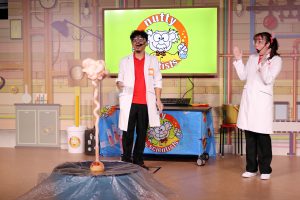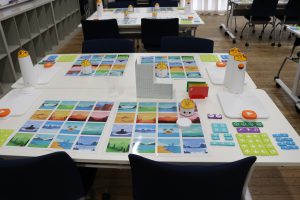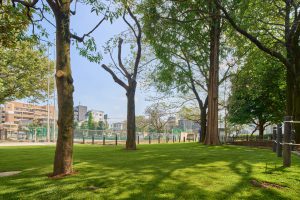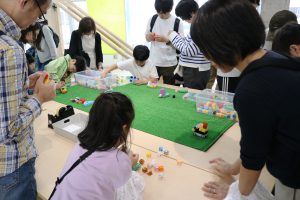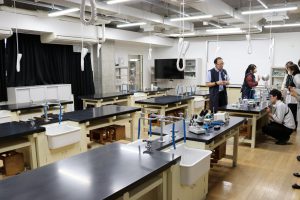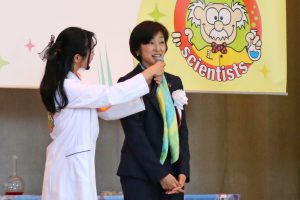Japan’s IAPCO member Congrès Inc. was selected and appointed by Suginami City (Tokyo) to undertake a public-private project to develop and operate/administer a “new hub for next-generation science education” utilizing a former elementary school in the city. The appointment was realized through a municipal leasing scheme that permits the selected company to independently undertake planning & operation of the facility.
In recent years, a key term in the field of education has been “STEAM education.” This educational concept combines the initials of “Science,” “Technology,” “Engineering,” “Art,” and “Mathematics.” In an era characterized by complexity and continuous change, there is a demand for learning that transcends the boundaries between the sciences and humanities, and works to develop problem-detection and problem-solving skills.
Here in Japan, the standards of science education are high, as seen in international comparative assessments of academic performance. Also, in 2000 and afterwards, Japanese scientists in the field of natural sciences have gained recognition for their research achievements.
However, science education in Japan faces challenges such as a decrease in research budgets and the outflow of researchers to overseas institutions. In schools, recently it has emerged that aspects such as “enjoyable learning” and “perceived usefulness” of science are becoming difficult, especially as students progress to middle school.
Looking toward the future of science education in Japan, fostering problem-detection and problem-solving abilities will be one key, and it will be essential to nurture “inquiring minds.” Mechanisms and spaces where science is learned not just as a subject of study but as something connected to life, can lead to enjoyable learning experiences.
Utilization of former school buildings for new endeavours was not a unique opportunity.
On account of Japan’s aging population and declining birth date, the number of public schools that have been closed nationwide is significant, 8,580 in total since April 2002. Nearly 1,200 of them having undetermined reuse purposes. These former schools are valuable assets for local governments, and by proactively utilizing them in accordance with the local situation and needs, various benefits such as reduction in public facility maintenance & improvement costs, as well as sustaining and revitalizing local communities, can be expected.
Congrès Inc. has been engaged in facility management of diverse facilities as part of our business portfolio, including concert halls, art and science museums, aquariums, and observations decks, both in Japan and in China. Operating these facilities demands the same kinds of services/support that PCOs provide for all types of meetings & events.
In fact, Congrès is the appointed facility manager for 6 science museums throughout Japan (Tokyo, Yokohama, Chiba, Kobe, Niigata, Yamanashi). As part of our facility management, we strive to involve the local community around the facilities we administer, linked to one of the pillars of our corporate philosophy: “Contribution to society through regional development and internationalization.”
Thus, when we heard about this opportunity to develop a new science museum in a former school building, we immediately thought it would be a great opportunity. As well as being confident of our record as a designated facility manager for public facilities, through direct management of this new “IMAGINUS,” we want to leverage all of the knowledge, experience and activities that we’ve implemented at these science facilities, and create our own Congrès original science museum. For us, this is not only a business project, but we also strongly desire to participate in a sustainable initiative to revive a former school building, give back to the community, and contribute to the education of the next generation.
IMAGINUS aims to offer space and time where visitors can naturally have fun in a science environment, while simultaneously raising awareness that the world of science is filled with originality, and aspects that can surprise and move people. By initiating the experience with “fun” as the primary focus, then visitors can discover science therein, leading to curiosity to learn more about science. The museum’s name comprises “Imagine” and “Us,” and is also an anagram of “Suginami,” the city’s name.
In today’s world that is constantly evolving and growing increasingly complex, science is certainly one conduit for understanding the mechanisms of the world we live in.
While the outside of IMAGINUS still retains the physical appearance of the school and grounds, once inside, visitors can experience the Nutty Scientists® show along with the many other features, including the “Science in Me” laboratory and the special exhibits area, as well as take part in full-scale hands-on scientific experiments, robot & programming workshops, Monozukuri Lab (craftsmanship/ creating something by hand), and other diverse workshops.
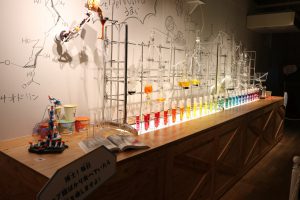
Experience Lab “Science in Me.” – As visitors proceed into the Science Show, they pass by this area where the scientists conduct experiments
The primary feature of the facility is Nutty Scientists®, an experiential science program in which more than 10 million people from more than 55 countries participate annually, which has landed in Japan for the first time. As a master franchisee, Congrès Inc. will give children opportunities to learn through experimentation, participation, and most of all – fun!
Admission to IMAGINUS is free, and prices vary for the programs. The facility aims to realize approx. 300,000 visitors per year.
On opening day, October 7, 2023, many residents and families from the community attended the opening ceremony, which featured experiments and performances, followed by the first Nutty Scientists® show!
In attendance were: the Mayor of Suginami City, Satoko Kishimoto, head of the city’s department of education and other city council members, the CEO of Nutty Scientists®, Santiago Martin, along with the President of Congrès Inc., TAKEUCHI Noriko.
In her remarks for the occasion, TAKEUCHI expressed her confidence that adult visitors could enjoy IMAGINUS as well, not only the nostalgia element of coming back to a school setting, but also the diverse content that adults can take advantage of and enjoy in various ways, such as the lab, the café, and the science show.”
TAKEUCHI also noted that IMAGINUS has community spaces that can be rented out for exhibitions and sports events, and a video studio for filming and livestreaming is also planned.
Congrès also plans to propose IMAGINUS as a venue for various types of MICE, considering the facilities’ community rooms and the gymnasium with a stage. Certainly it would make a memorable unique venue, and could be an interesting choice for events that aim to foster engagement and motivation, in addition to those for team-building.
As part of the Opening Ceremony, the “professors” and assistants put on a full-scale science demonstration/performance, with several children from Suginami City taking part in the air cannon experiment. Then, a representative instructor/trainer from Nutty Scientists® who came to Japan specially for the opening, took the stage and demonstrated an eruption of smoke using dry ice that thrilled the audience. All in all, it was an opening ceremony truly befitting an experiential science museum!
IMAGINUS is a facility that combines the expertise of both local government and the private sector, represented by Congrès, for planning and operation. If it can establish a track record as a new science experience facility rooted in the community, the facility could become one of the new model cases for reuse of closed schools.
Congrès hopes that through operating IMAGINUS, we can strive to foster relationships with the real citizens actually living in the community, while carrying out operations with a policy conscious of connections with the local community. We have high hopes that “IMAGINUS” will create a legacy for the community going forward, and become a place loved by everyone, regardless of age, gender, scientific knowledge, or learning experience.
